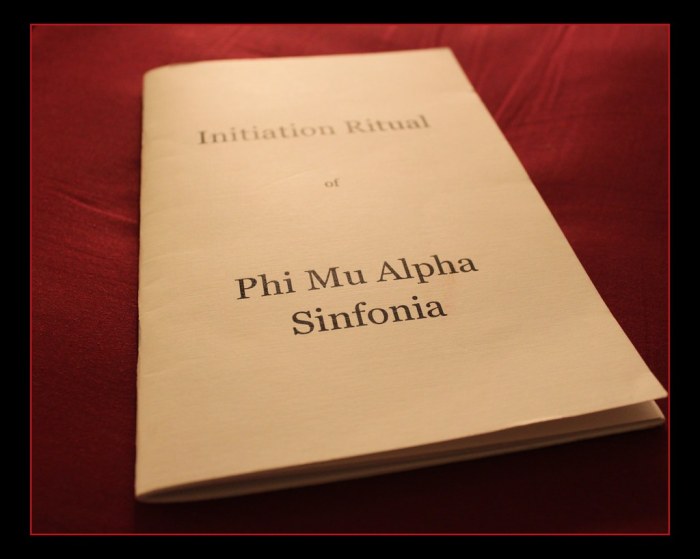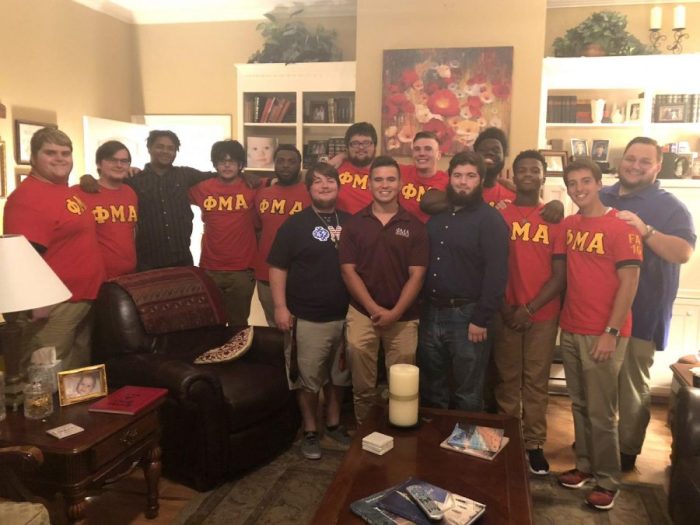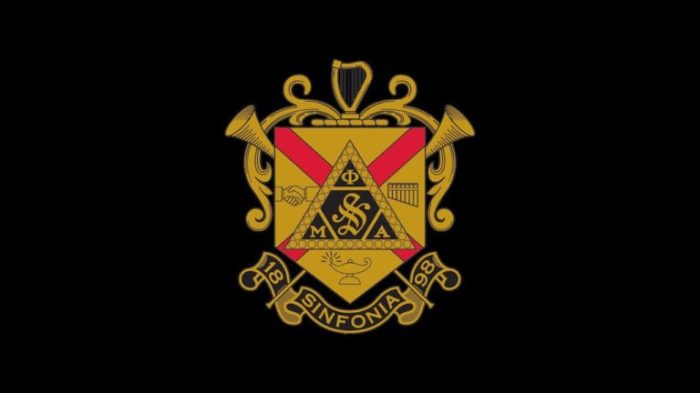Phi Mu Alpha Sinfonia secrets unveil a captivating narrative, inviting readers to delve into a world steeped in tradition, excellence, and the transformative power of music. From its enigmatic rituals to its profound impact on music education, this esteemed fraternity holds a treasure trove of untold stories waiting to be discovered.
Established in 1898, Phi Mu Alpha Sinfonia has fostered a legacy of nurturing musical talent and shaping the lives of countless individuals. Its members, bound by a shared passion for music, have played an instrumental role in advancing the art form and inspiring generations of musicians.
History of Phi Mu Alpha Sinfonia: Phi Mu Alpha Sinfonia Secrets

Phi Mu Alpha Sinfonia (PMAS) is the oldest and largest national music fraternity in the United States. It was founded in 1898 at the New England Conservatory of Music in Boston, Massachusetts, by a group of music students who sought to create a community for musicians and to promote the art of music.
The founding principles of PMAS are based on the ideals of brotherhood, scholarship, and service. The fraternity’s mission is to promote the development of musicians, to foster a love of music, and to serve the community through music.
Evolution of Phi Mu Alpha Sinfonia
Over the years, PMAS has evolved to become a diverse and inclusive organization. Today, the fraternity has over 200 chapters on college campuses across the United States and Canada. PMAS members come from all walks of life, and they represent a wide range of musical backgrounds and interests.
The fraternity has also expanded its mission to include a focus on social justice and community outreach. PMAS chapters regularly organize concerts, workshops, and other events that are open to the public. The fraternity also provides financial support to music education programs and scholarships for music students.
Membership and Structure

Phi Mu Alpha Sinfonia values musical excellence and fosters brotherhood among its members. To maintain these ideals, the organization has established eligibility requirements and a hierarchical structure.
Eligibility Requirements
- Male students who have demonstrated musical talent and character.
- Active participation in a music program at an accredited institution.
- Willingness to uphold the organization’s ideals and contribute to its success.
Hierarchical Structure, Phi mu alpha sinfonia secrets
The organization is structured hierarchically, with different levels of membership and leadership:
- Members:Active members who participate in chapter activities and uphold the organization’s ideals.
- Officers:Elected members who lead the chapter and oversee its operations.
- Alumni:Former members who have graduated or left the university.
- National Council:The governing body of the organization, responsible for its overall direction and policies.
Roles and Responsibilities
Members at different levels have specific roles and responsibilities:
Members
- Attend chapter meetings and events.
- Participate in musical performances and activities.
- Uphold the organization’s ideals and contribute to its success.
Officers
- Lead the chapter and oversee its operations.
- Plan and execute chapter activities.
- Represent the chapter at regional and national events.
Alumni
- Stay connected with the organization and support its mission.
- Provide mentorship and guidance to current members.
- Participate in alumni events and activities.
National Council
- Set the strategic direction for the organization.
- Establish policies and procedures.
- Support and oversee chapters.
Through its hierarchical structure and well-defined roles and responsibilities, Phi Mu Alpha Sinfonia ensures the organization’s continued success and the development of its members as musicians and leaders.
Rituals and Traditions
Phi Mu Alpha Sinfonia holds a collection of secret rituals and traditions that play a crucial role in shaping the organization’s identity and fostering a sense of brotherhood among its members. These rituals and traditions have been passed down through generations, contributing to the organization’s rich history and legacy.
One of the most significant rituals is the initiation ceremony, where new members are formally welcomed into the fraternity. This ceremony involves a series of symbolic gestures and oaths that emphasize the organization’s values of brotherhood, musicianship, and scholarship. The ceremony is designed to create a profound and lasting bond between the new members and the organization.
Secrecy
The secrecy surrounding Phi Mu Alpha Sinfonia’s rituals and traditions contributes to their mystique and exclusivity. By keeping these rituals confidential, the organization maintains a sense of privacy and intimacy among its members. The secrecy also serves to protect the organization’s traditions from outside influences and ensures that they are preserved in their original form.
Symbolism
Phi Mu Alpha Sinfonia’s rituals and traditions are rich in symbolism. The organization’s emblem, for example, features a lyre, a symbol of music, and a torch, representing knowledge and enlightenment. The colors of the organization, red and white, represent passion and purity, respectively.
These symbols serve as constant reminders of the organization’s values and aspirations.
Sense of Community
The rituals and traditions of Phi Mu Alpha Sinfonia foster a strong sense of community among its members. By participating in these rituals, members feel connected to a larger purpose and a shared history. The organization’s traditions provide a framework for social interaction and create opportunities for members to bond with each other.
Impact on Music Education

Phi Mu Alpha Sinfonia has made significant contributions to music education, fostering the development of young musicians and promoting the importance of music in education.
The organization supports and promotes music education through various initiatives and programs, including:
Music Education Initiatives
- National Music Education Week:Phi Mu Alpha Sinfonia actively participates in National Music Education Week, promoting music education and recognizing the contributions of music educators.
- Student Chapters:The organization has established student chapters at universities and colleges across the United States, providing opportunities for music students to engage in professional development, mentorship, and community service.
- Music Therapy:Phi Mu Alpha Sinfonia recognizes the therapeutic benefits of music and supports music therapy programs through scholarships and grants.
- Advocacy:The organization advocates for music education policies that support and enhance music programs in schools and communities.
Controversies and Challenges
Phi Mu Alpha Sinfonia has faced various controversies and challenges throughout its history, including allegations of hazing and discrimination. In response, the organization has implemented policies and procedures to address these issues, demonstrating its commitment to fostering a safe and inclusive environment for its members.
Hazing Allegations
In the past, Phi Mu Alpha Sinfonia has been accused of hazing. Hazing refers to any form of physical or psychological abuse or humiliation inflicted on new members or pledges as part of their initiation process. The organization takes these allegations seriously and has implemented strict anti-hazing policies to prevent such behaviors.
Unveiling the secrets of Phi Mu Alpha Sinfonia, a prestigious music fraternity, can be an intriguing endeavor. While this organization holds its traditions close, there’s always something fascinating to discover. Just like the intricate plot of The Kite Runner, as outlined in this MLA citation , Phi Mu Alpha Sinfonia’s history and rituals are a captivating blend of music and brotherhood.
These policies include mandatory training for all members on hazing prevention, a zero-tolerance policy towards any form of hazing, and a reporting system for individuals to report any suspected hazing incidents.
Discrimination Allegations
Phi Mu Alpha Sinfonia has also faced allegations of discrimination, particularly based on race and sexual orientation. The organization has taken proactive steps to address these concerns and promote diversity and inclusion within its ranks. These efforts include establishing a diversity and inclusion committee, developing educational programs on diversity and inclusion, and working with external organizations to promote underrepresented groups in music education.
Notable Members and Alumni

Phi Mu Alpha Sinfonia has a distinguished history of producing talented musicians and leaders in the field of music. Over the years, the organization has inducted numerous notable members and alumni who have made significant contributions to the music industry and beyond.
These individuals have not only excelled in their musical endeavors but have also played a vital role in shaping the organization’s legacy and promoting its mission of fostering musical excellence and brotherhood.
Prominent Musicians
- Leonard Bernstein: Renowned composer, conductor, and pianist known for his works such as “West Side Story” and “Candide.”
- Aaron Copland: American composer best known for his orchestral works, including “Appalachian Spring” and “Fanfare for the Common Man.”
- Samuel Barber: American composer known for his operas, orchestral works, and choral music, including “Adagio for Strings.”
- Lukas Foss: American composer, conductor, and pianist who served as music director of the Buffalo Philharmonic Orchestra.
- André Previn: German-born American pianist, conductor, and composer known for his work in both classical and jazz music.
Educators and Administrators
- John Philip Sousa: Known as the “March King,” Sousa was a composer, conductor, and bandmaster who founded the United States Marine Band.
- Edwin Franko Goldman: American bandmaster and composer known for his contributions to the development of the concert band.
- Frederick Fennell: American conductor and music educator who founded the Eastman Wind Ensemble.
- William D. Revelli: American conductor and music educator known for his work with the University of Michigan Band.
- Harry Begian: American conductor and music educator who served as director of bands at the University of Illinois at Urbana-Champaign.
Other Notable Members
- John F. Kennedy: 35th President of the United States, was an honorary member of Phi Mu Alpha Sinfonia.
- Neil Armstrong: First person to walk on the moon, was an honorary member of Phi Mu Alpha Sinfonia.
- Walter Cronkite: American journalist and news anchor, was an honorary member of Phi Mu Alpha Sinfonia.
- Bob Hope: American comedian, actor, and singer, was an honorary member of Phi Mu Alpha Sinfonia.
- Carl Sagan: American astronomer, cosmologist, and author, was an honorary member of Phi Mu Alpha Sinfonia.
These notable members and alumni have not only left an indelible mark on the music world but have also contributed to the advancement of Phi Mu Alpha Sinfonia’s ideals and mission. Their achievements and dedication have helped to shape the organization into the respected and influential institution it is today.
Future Prospects and Legacy
Phi Mu Alpha Sinfonia is well-positioned to continue its legacy of excellence in music education. The organization has a strong foundation of dedicated members, a rich history, and a commitment to innovation.Phi Mu Alpha Sinfonia has several plans for growth and innovation in the coming years.
These include expanding its membership base, developing new programs and initiatives, and increasing its visibility in the music community.The organization is also committed to preserving its legacy while adapting to changing times. Phi Mu Alpha Sinfonia is constantly reviewing its rituals and traditions to ensure that they remain relevant and meaningful.
The organization is also working to develop new ways to engage with its members and the broader music community.
Preserving Legacy
Phi Mu Alpha Sinfonia has a long and proud history, and the organization is committed to preserving its legacy. The organization’s rituals and traditions are an important part of its identity, and they will continue to be observed in the years to come.Phi
Mu Alpha Sinfonia is also committed to preserving its archives. The organization’s archives contain a wealth of historical documents, photographs, and other artifacts that tell the story of Phi Mu Alpha Sinfonia’s past. The organization is working to digitize its archives and make them available to the public.
Essential FAQs
What are the core principles of Phi Mu Alpha Sinfonia?
Phi Mu Alpha Sinfonia is founded on the principles of friendship, love, and music. These principles guide the fraternity’s activities and foster a sense of community among its members.
What is the significance of the fraternity’s secret rituals?
The secret rituals of Phi Mu Alpha Sinfonia contribute to the fraternity’s unique identity and sense of brotherhood. They serve as a means of initiation, bonding, and传承 of the fraternity’s values.
How does Phi Mu Alpha Sinfonia support music education?
Phi Mu Alpha Sinfonia provides scholarships, awards, and grants to support music students and educators. The fraternity also sponsors music education programs and initiatives to promote the appreciation and advancement of music.